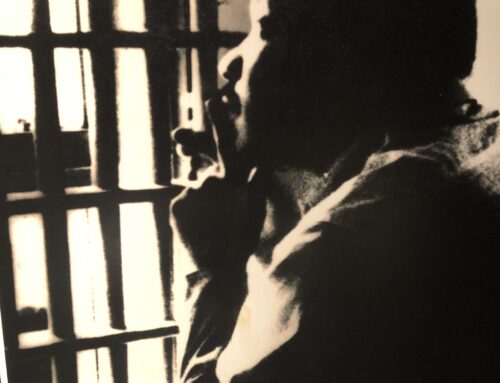
“A day will come for rebuilding your walls; on that day your boundary will be extended.” Micah 7:11
Pestilence and pain come to us for all kinds of reasons. Sometimes suffering comes from the Lord as an instrument of discipline, and at other times it is simply the result of living in fallen world where sin, Satan, and evil still have influence. Either way, there is no suffering that comes to us that does not pass through the hands of our Heavenly Father.
And like the perfect Father that He is, the Lord God never leaves us alone in our pain. Pain is never the endgame: reconciliation and restoration are His aim.
So while these days are tough and will get tougher, the Lord is with us. He calling us to Himself, and His aim is to restore, rebuild, and to extend our boundaries for the name and fame of Jesus.
As we walk through this together, consider these four important shifts in our thinking:
Shift #1: Short-term response to a long-term strategy
In these first few days of this pandemic response, most churches moved quickly to get online and create systems for the delivery of biblical content and for providing care to our congregations. We’re all still working it, and should keep improving.
There will be a day when we gather again for worship, small groups, and face-to-face ministry. I’m excited about that, but church as we know it will change. None of us knows exactly what that means, but we should prepare our hearts and minds for church ministry to take new forms in the future. Getting us back to normal is likely not God’s purpose for this season of suffering.
Shift #2: An attendance motivation to a critical care motivation
We have a few metrics that help us track how many people find us and watch us online, but we really don’t know the extent of our reach. Beyond each of us inviting friends to watch, we are really in no position to control or even measure attendance numbers. What we can control is the ministry we have to our neighbors.
Sickness, death, and financial pain are coming to town. Our family members and neighbors will be impacted. All of us will be affected, so the focus of churches must shift from how many people gather on Sunday to how well we serve needy people around us as we show and share the Gospel.
Safety is a big concern, so what churches organize and the number of volunteers we recruit will be limited. That means ministry will become further de-centralized away from church programming and will require more intentional, proactive, and personal attention from each and every Christian.
We expect new ministries to emerge, but church leaders will not conceive of them or manage them.
These ministries may include prayer walking in our neighborhoods, finding unique ways to discover and meet specific needs, and simply making phone calls.
The point is that how we each serve the elderly, the single mom, healthcare and other essential workers, and how we come beside people who are hurting will emerge from individual believers walking with Jesus and allowing His life to be live out through ours.
Shift #3: A large ministry menu to a narrow ministry priority
In normal days, churches do a variety of things in order to reach our neighbors and expand our capacity to make disciples of Jesus. The menu of options is extensive. Our Great Commission, disciple-making mission has not changed, but the circumstances do not allow us simply to do the same things we’ve always done in different ways.
For example, we can offer an online worship service and we can keep our small groups connected through online meeting rooms, but that’s just about the limit of our “regular programming” that’s possible. And even that falls short.
Many churches are scrambling to “keep things going.” I appreciate the thoughtfulness behind that and the desire for normalcy, but attempts to do what we normally do will limit our ability to do what must be done in this moment to serve our neighbors well.
Shift #4: The 2020 Financial Plan to a Modified Financial Plan
Churches began 2020 with a financial plan. Mike Tyson is famous for saying we all have a plan until we get punched in the face. For the last three Sundays, churches have been punched in the face.
Our actual receipts are well below anticipated receipts. Therefore, church leaders must adjust planned expenses. We should explore options associated with the CARES Act. If your church has reserved funds on hand, give thanks.
The financial impact, however, on every church will be significant. Some will close, most will struggle, but we will all get through this. A year from now, we will look back and be able to see God’s faithfulness.
For now, our responsibility is to be good stewards of this situation and of the resources God has given to us. So pastors and other church leaders should be open about the financial situation. We should ask the church to pray for the church’s operating needs and to be faithful to give online or through the U.S. Post Office.
More than anything else, this is the moment we invite our congregations to trust God’s perfect provision. And as we pray, we ask for greater faith, wisdom, and courage to make the best decisions to serve the purposes of God in this season. The Lord will see us through.
The Close
These four shifts may feel like we are retreating, like we’re going backwards. Perhaps in some ways we will lose momentum. But if you will notice, the shifts necessary in this moment are shifts pastors would want our congregations to make under the best of circumstances. Moving believers into ministry, pursuing the Jesus-shaped life, de-centralizing ministry efforts, and making disciples of Jesus where we live, work, and play are values we all pursue. So what might feel like a loss today, what are actual and devastating losses, may produce our greatest Kingdom advances yet.
The Lord God is good and His mercies endure forever. He is faithful and we trust Him to rebuild our walls and expand our borders as we introduce Jesus as the sufficient Savior that He is.
Photo by Evgeni Tcherkasski on Unsplash





